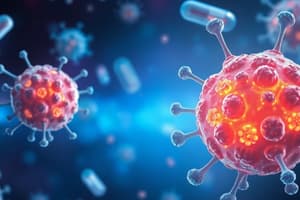Podcast
Questions and Answers
What is a primary cause of antibiotic resistance in bacteria?
What is a primary cause of antibiotic resistance in bacteria?
- High fluid intake
- Natural selection of resistant strains (correct)
- Increased hand hygiene
- Overuse of vaccines
Which of the following is NOT a mechanism through which bacteria develop antibiotic resistance?
Which of the following is NOT a mechanism through which bacteria develop antibiotic resistance?
- Increased immune response (correct)
- Inactivation of the antibiotic
- Modification of target structures
- Decreased antibiotic permeability
What effect does antibiotic therapy have on non-target bacteria in the body?
What effect does antibiotic therapy have on non-target bacteria in the body?
- Eliminates all bacteria, including beneficial ones (correct)
- Has no effect on non-target bacteria
- Promotes growth of beneficial bacteria
- Only targets harmful bacteria
Which of the following describes an incorrect practice of antibiotic use by clinicians?
Which of the following describes an incorrect practice of antibiotic use by clinicians?
Which factor is LEAST likely to cause the spread of antibiotic resistance?
Which factor is LEAST likely to cause the spread of antibiotic resistance?
What is the common property shared by all antibiotics?
What is the common property shared by all antibiotics?
Which type of drug would be classified as an antiviral?
Which type of drug would be classified as an antiviral?
What distinguishes a bactericidal agent from a bacteriostatic one?
What distinguishes a bactericidal agent from a bacteriostatic one?
Which of the following best describes the spectrum of an antibiotic?
Which of the following best describes the spectrum of an antibiotic?
Which antimicrobial agents can be classified as bactericidal?
Which antimicrobial agents can be classified as bactericidal?
What is a common reason for using antibiotics in seriously ill patients even without knowing the pathogen?
What is a common reason for using antibiotics in seriously ill patients even without knowing the pathogen?
Which statement is true regarding the duration of antibiotic treatment?
Which statement is true regarding the duration of antibiotic treatment?
What is a potential risk factor for prescribing antibiotics?
What is a potential risk factor for prescribing antibiotics?
Which route of administration is NOT commonly used for antibiotics?
Which route of administration is NOT commonly used for antibiotics?
Why is bacterial resistance considered a growing problem?
Why is bacterial resistance considered a growing problem?
What is one primary reason for associating different antibiotics?
What is one primary reason for associating different antibiotics?
Which factor does NOT typically influence the choice of antibiotics?
Which factor does NOT typically influence the choice of antibiotics?
What is the purpose of conducting serial cultures during antibiotic treatment?
What is the purpose of conducting serial cultures during antibiotic treatment?
Which type of bacteria is resistant to penicillinases?
Which type of bacteria is resistant to penicillinases?
What is the main use of amoxicillin-clavulanic acid?
What is the main use of amoxicillin-clavulanic acid?
Which of the following antibiotics is used for treating cellulitis?
Which of the following antibiotics is used for treating cellulitis?
What is the primary indication for penicillin G?
What is the primary indication for penicillin G?
Which class of antibiotics includes ampicillin?
Which class of antibiotics includes ampicillin?
What is the primary mechanism of action for lincosamides?
What is the primary mechanism of action for lincosamides?
Which of the following antibiotics is NOT effective against aerobic gram-negative bacteria?
Which of the following antibiotics is NOT effective against aerobic gram-negative bacteria?
What is the most significant adverse reaction associated with clindamycin use?
What is the most significant adverse reaction associated with clindamycin use?
Which of the following describes the pharmacokinetic property of clindamycin?
Which of the following describes the pharmacokinetic property of clindamycin?
What is the main indication for using difficile in vitro?
What is the main indication for using difficile in vitro?
Which condition can clindamycin be used as an alternative treatment for?
Which condition can clindamycin be used as an alternative treatment for?
Resistance to lincosamides is similar to which antibiotic?
Resistance to lincosamides is similar to which antibiotic?
What gastrointestinal side effect is reported in 30-35% of patients taking clindamycin?
What gastrointestinal side effect is reported in 30-35% of patients taking clindamycin?
Which condition represents a deep or systemic fungal infection?
Which condition represents a deep or systemic fungal infection?
What adverse reaction is commonly associated with Amphotericin B treatment?
What adverse reaction is commonly associated with Amphotericin B treatment?
What is a key consideration in treating fungal infections in immunocompromised patients?
What is a key consideration in treating fungal infections in immunocompromised patients?
Which antifungal agent binds to sterols in the fungal cell membrane, forming channels that disrupt membrane permeability?
Which antifungal agent binds to sterols in the fungal cell membrane, forming channels that disrupt membrane permeability?
What is one of the mechanisms of action of azole antifungals?
What is one of the mechanisms of action of azole antifungals?
Which classification of antifungal affects cell wall synthesis?
Which classification of antifungal affects cell wall synthesis?
What factor does not directly influence the treatment of fungal infections?
What factor does not directly influence the treatment of fungal infections?
Which formulation of Amphotericin B is associated with less nephrotoxicity?
Which formulation of Amphotericin B is associated with less nephrotoxicity?
Flashcards
Antibiotic
Antibiotic
A substance that kills or inhibits the growth of microorganisms, specifically bacteria.
Spectrum (of an antibiotic)
Spectrum (of an antibiotic)
The range of organisms that an antibiotic is effective against.
Bactericidal antibiotic
Bactericidal antibiotic
An antibiotic that kills bacteria.
Bacteriostatic antibiotic
Bacteriostatic antibiotic
Signup and view all the flashcards
Selective Toxicity
Selective Toxicity
Signup and view all the flashcards
Antibiotic Misuse
Antibiotic Misuse
Signup and view all the flashcards
Antibiotic Resistance
Antibiotic Resistance
Signup and view all the flashcards
Spread of Resistance
Spread of Resistance
Signup and view all the flashcards
Empirical treatment
Empirical treatment
Signup and view all the flashcards
Minimum Inhibitory Concentration (MIC)
Minimum Inhibitory Concentration (MIC)
Signup and view all the flashcards
Bactericidal
Bactericidal
Signup and view all the flashcards
Bacteriostatic
Bacteriostatic
Signup and view all the flashcards
Antibiogram
Antibiogram
Signup and view all the flashcards
Antibiotic association
Antibiotic association
Signup and view all the flashcards
Bacterial resistance
Bacterial resistance
Signup and view all the flashcards
Routes of administration
Routes of administration
Signup and view all the flashcards
Penicillinase-resistant penicillin
Penicillinase-resistant penicillin
Signup and view all the flashcards
Cloxacillin
Cloxacillin
Signup and view all the flashcards
Aminopenicillins
Aminopenicillins
Signup and view all the flashcards
Anti-pseudomonal penicillin (e.g., Piperacillin)
Anti-pseudomonal penicillin (e.g., Piperacillin)
Signup and view all the flashcards
Penicillin with beta-lactamase inhibitor
Penicillin with beta-lactamase inhibitor
Signup and view all the flashcards
Superficial Mycoses
Superficial Mycoses
Signup and view all the flashcards
Deep or Systemic Mycoses
Deep or Systemic Mycoses
Signup and view all the flashcards
Ringworm
Ringworm
Signup and view all the flashcards
Aspergillosis
Aspergillosis
Signup and view all the flashcards
Polyene Antifungals
Polyene Antifungals
Signup and view all the flashcards
Amphotericin B
Amphotericin B
Signup and view all the flashcards
Nephrotoxicity
Nephrotoxicity
Signup and view all the flashcards
Azoles
Azoles
Signup and view all the flashcards
Lincosamide
Lincosamide
Signup and view all the flashcards
Pseudomembranous Colitis
Pseudomembranous Colitis
Signup and view all the flashcards
Antibacterial Spectrum
Antibacterial Spectrum
Signup and view all the flashcards
Fidaxomicin
Fidaxomicin
Signup and view all the flashcards
C. difficile-Targeted Antibiotic
C. difficile-Targeted Antibiotic
Signup and view all the flashcards
Good Oral Absorption
Good Oral Absorption
Signup and view all the flashcards
Hepatic Metabolism
Hepatic Metabolism
Signup and view all the flashcards
Study Notes
General Principles of Use of Antibacterial Drugs
- Antibiotic - an anti-infective compound produced by microorganisms or synthesized chemically
- Selective toxicity - the antibiotic's toxicity is greater towards invading organisms than towards human host tissues
- Spectrum - the range of pathogens affected by the antibiotic (antibacterial, antiviral, antifungal, or antiparasitic)
Bactericide / Bacteriostatic
- Bactericidal - agents that kill the microorganism
- Bacteriostatic - agents that inhibit bacterial growth and replication
- Action - depends on the mechanism of action, concentration at the site of action, and the size of the inoculum
Type of Antibiotic Treatment
- Empirical - chosen without knowing the specific germ causing the infection
- Specific - chosen after identifying the germ and knowing the antibiogram
Antibacterial Activity
- Susceptibility - how susceptible the bacterial strain is to the antibiotic
- Types - susceptible, intermediate, or resistant
- Quantification - using methods like diffusion and dilution techniques
MIC (Minimum Inhibitory Concentration)
- The lowest concentration of antibiotic capable of inhibiting the growth of microorganisms in a given medium after a certain period of incubation.
Studying That Suits You
Use AI to generate personalized quizzes and flashcards to suit your learning preferences.




